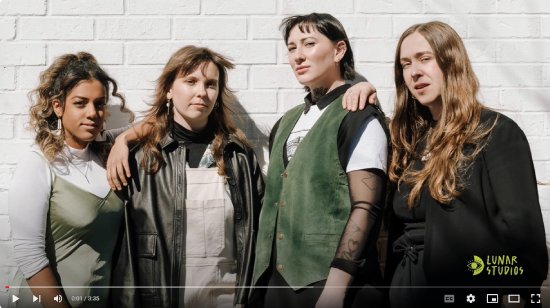With this article, Words & Music introduces a new series, Music for Good, telling the stories of organizations and initiatives aimed at improving our world.
When one door opens, 10 more appear. After a trio of songwriters listened to Canadian women from coast to coast share their corporate workplace experiences, that message came back, on repeat, in story after story.
“There is no real glass ceiling,” singer-songwriter Jay “Your Hunni” Galluccio explains. “It’s more like a revolving door. You get a promotion and think, ‘Now everything will open up’ – only to find 10 more obstacles in your way. It feels like you’re walking down this never-ending hallway.”
During these deep listening sessions, rising non-binary artist Your Hunni, along with fellow Torontonians Madelyn Kirby and Meagan De Lima, were flies-on-the-wall. Hearing these stories was a part of their participation in Lunar Studios’ Artist-in-Residence program and the grassroots national research project HeARTwork — aimed at advancing women in leadership positions. Lunar Studios’ annual residency provides emerging Canadian artists with the opportunity to use their music as a tool for social change. Conscious Economics chose the trio for this residency after working with them on previous projects.
“Changing” – a stirring song Your Hunni co-wrote with Kirby and De Lima – is the culmination of the year-long residency. Serena Ryder produced it, and Brian Kobayakawa mixed the song, which the trio created in two quick co-writing sessions. Many of the lyrics are direct quotes taken from the focus groups; the chorus is a rallying cry for women’s empowerment:
I’m not yours to break this time
I’m taking back the fire I had when I started
Like the burning sun I’ll rise
I am trying, fighting, changing
“It was heavy,” recalls Kirby of this rewarding, eye-opening experience. “Listening to women across Canada, in every province, talk about their experiences. And then taking all this information, [these] feelings and emotions, and paring [them] down into one song was hard, but also easy at the same time.
“We had the chords and wrote the first verse, chorus and part of the second verse in our first writing session,” she adds. “The lyrics came quick. Before going into the studio, we each had notes we had circled and underlined, of what women actually said. We just manipulated these to fit the rest of our lyrics, and the story we were trying to write.”
Hearing these women’s stories felt frustrating. And, initially, they left Your Hunni feeling hopeless. “They were doing something new in a system that wasn’t built for them,” they say. “On the other hand, I saw this ridiculous resilience and ‘bad-assery’ from them as they each found creative avenues to work their way up despite all the roadblocks.”
By coincidence, the empowering song was recorded on International Women’s Day (March 8) 2023, which added to the energy and vibe of the final cut. “Changing” was released as a single in the summer of 2023. Ryder, as producer, made a few minor edits to the words, the harmony, and the melody. “It made our point come across more clearly,” says Kirby. “It’s nice when you work on a song to have an outsider give their perspective.”
Adds Your Hunni, “Serena listened to the song and edited our lyrics based on her career. It was empowering to learn from someone in the music industry who’s lived those experiences.”
“There is no real glass ceiling. It’s more like a revolving door” – Jay “Your Hunni” Galluccio
To illustrate the subtle type of change the seven-time-JUNO-winning singer-songwriter made, check the following line: “Gonna burn this rulebook you made for them.” The rulebook here comprises the inherent workplace guidelines written by – and for –men. The original lyric was: “Gonna burn this rulebook you made for us.” Ryder explained to the songwriters that these rules were never written for women.
The artists are grateful they were a part of the making of this song; they also hope it gets in front of as many people as possible, to inspire change and create more inclusive and equitable workplaces for women to advance their careers.
“As a creative, I try to write music from my heart,” says De Lima. “If there’s no heart in it, what are you doing an emotional thing for? When I write a song, if it’s helped me in some way, my goal is that when I put it out into the world, it can create a ripple effect and maybe help somebody else… That’s my hope with this song.”
